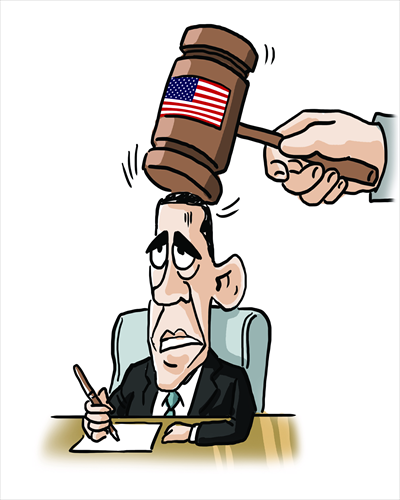Chinese capital poses dilemma for West

Illustration: Liu Rui/GT
A US federal court of appeal has just made a verdict in favor of the Sany Group, a Chinese machinery company, after it sued the Obama administration for infringement of their legal rights in 2012, and the court ruled that the directive issued by the US federal government violated the Chinese company's constitutionally protected property rights. The verdict was welcomed as a "historical victory" by Xiang Wenbo, director of the board of the Sany Group.
Undoubtedly, the ruling is a landmark case because it's the first one to legally challenge a decision of the Committee on Foreign Investment in the US (CFIUS). And this victory has a particular significance for Chinese-owned companies in their bid to safeguard their rights and interests in the US.
However, what the ruling demonstrates more in this case is in my opinion the "dilemma" of Western governments especially the US and the EU versus the inflow of Chinese outbound investment (OBI).
On the one hand, the US and the EU need Chinese capital.
Severely struck since 2008 by global financial crisis, the subprime crisis for the US and sovereign debt crisis for the vast majority of eurozone member states, the economy of Organisation for Economic Co-operation and Development (OECD) states have experienced a frustrating economic recession or stagnation.
Fortunately, China was among the rare economies succeeding in resisting against financial crisis although its GDP growth also slowed. As a result, China's OBI flows are more welcomed than before by US and EU governments looking to meet recovery targets.
On the other hand, the US and the EU are afraid of Chinese capital. This worry can be due to historical memory of ideological differences during Cold War between the West and the East, and also due to actual divergence in the choice of political systems between the US or the EU and China.
The excuses frequently used are the "state security" by US authorities, and the "illicit competition" by European Commission. These pretexts have the same nature. Fundamentally they fear Chinese capital. That's why the victory of the Sany Group is so precious for Chinese-owned companies worldwide.
Today, we can find numerous explanations to justify this victory: the separation of executive, legislative and judicial powers, the rule of law in the US, and that Sany is not a typical state security-sensitive firm.
What kind of lesson or experience can be drawn from this case? As for Chinese enterprises, in order to realize "internationalization," we need to first study "localization." This is essential for Chinese enterprises to adapt themselves to a foreign investment, especially in the OECD member states which are the most industrialized economies and also have the most sophisticated and complicated legal systems. Chinese firms should adopt different strategies in different places.
As for US President Barack Obama, this ruling can also be a lesson.
It was understandable for him to use his power of administrative intervention in 2012 to favor his presidential election, sending a message to the US public that he had the will and the capacity to protect US products and markets. However, the "politicization" of simple commercial problems with administrative intervention did not work this time.
Compared with the EU, the US government uses administrative intervention more frequently to prevent Chinese capital from flowing into the US market, which is considered by the academic world to be a "frictionless" market. But this verdict may be a sign that this will change.
Still facing a sovereign and liquidity crisis in most member states, the EU needs Chinese foreign direct investment. The US has seen stronger economic growth since last year, but still needs Chinese capital for its recovery and sustainable growth.
It is inevitable for Chinese enterprises, which are going global, to adopt customized strategies in borrowing local legal tools to settle conflicts or differences with local economic entities or political authorities.
Even though it will be difficult for this verdict to have a significant impact on future CFIUS rulings, Sany's victory will be a real landmark.
The author is secretary-general of the Paris-based China-France Association of Lawyers and Economists. opinion@globaltimes.com.cn